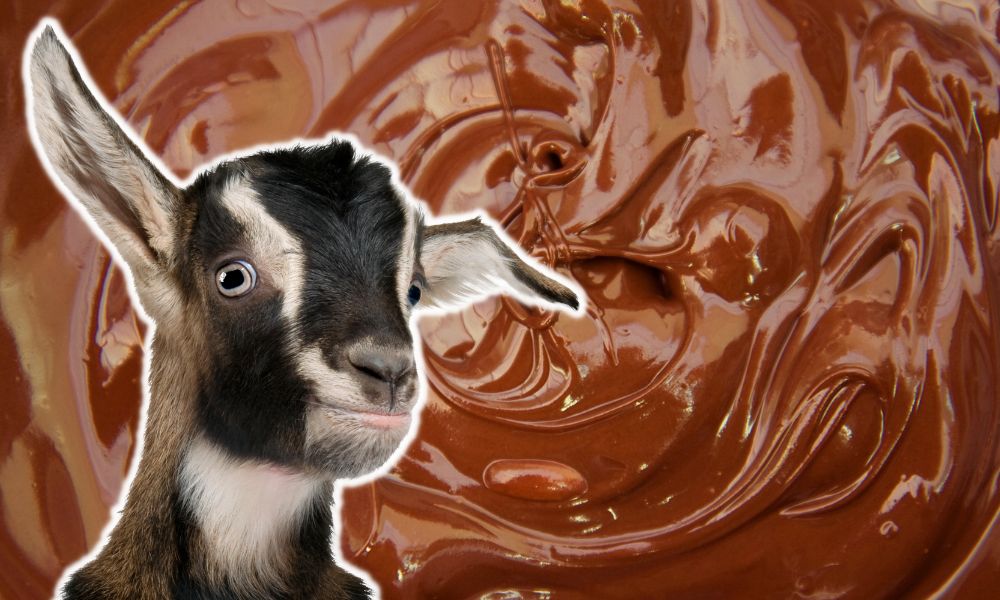Theobromine is the compound in chocolate that has been found to be toxic to some mammals.
It is like caffeine in that it can be used medically as a diuretic, heart stimulant, and blood vessel dilator.
Too much of it can cause trembling, severe headaches and excessive sweating, and can lead to heart failure.
Dogs are especially susceptible to theobromine poisoning because they cannot metabolize the compound.
As little as 1 ounce of chocolate is enough to poison and potentially kill a dog and in large amounts it’s enough to kill bears.
Theobromine is also toxic to cats and mice.
Since goats will grab at anything within reach, make sure to keep chocolate far away from them.
We’ll explore further what food is toxic to goats and should be avoided, what you can give your goat as a treat, and other details about the best food for goats.

Can goats eat dark chocolate?
No, scientists find that dark chocolate has even higher levels of theobromine, making it even more deadly.
The concentration of theobromine in dark chocolate is said to be ten times that of milk chocolate.
Symptoms of theobromine – or chocolate – poisoning in goats are nausea, vomiting, diarrhea, and increased urination.
This can progress to seizures, internal bleeding, and death.
Can goats eat milk chocolate?
No, although it has lower concentrations of theobromine, it’s still a danger to feed milk chocolate to your goat.
Like dogs and cats, goats can’t digest theobromine.
It can slow their heart rate down and lead to seizures.
Scientists say if poisoning is caught early on, it can be treatable, but there is not a lot of data on this, and it is not worth taking a chance.
Can goats eat white chocolate?
No, like dark and milk chocolate, white chocolate also includes theobromine and should be avoided at all costs.
It’s not worth the risk of poisoning.
What do you do if your goat gets poisoned?
If chocolate poisoning is caught early, veterinarians will induce vomiting and use activated charcoal to prevent the theobromine from being absorbed into the body.
They may also provide intravenous fluids to your goat to help get the compound out of their system.
You should monitor your goat for at least 72 hours for any signs of potential poisoning.
What other foods are poisonous to goats?
Goats might try to eat everything in sight, but that doesn’t mean they can eat everything without facing some health risks.
In addition to chocolate, there are many other foods that are poisonous so be careful what you feed your goat.
Do a little research about what plants that are toxic to goats to be sure you don’t have any near you.
Goats can be nosy and will try anything – even if it seems out of reach so it’s important to keep their grazing area as clear as possible.
What do goats eat for treats?
Chocolate is out of the question, but there are some more natural foods that you can feed your goat for a sweet treat that they will enjoy.
The best treats for goats are fruit or sweeter vegetables.
Although goats will eat anything, it’s best to try and keep their diet as healthy and clean as possible.
Some treats goats enjoy include:
Bananas, Carrots, Grapes, Watermelon, Lettuce, Pears, Pumpkins & Squash.
Goats love to eat human food too like Cheerios, marshmallows, and crackers, but goats can’t process a lot of sugar, and eating too much of it could cause digestive problems.
Make sure you only feed them these high-sugar foods in moderation.
Experiment to see what your goat prefers.
Owners report that many of their goats have varying tastes. Some ignore vegetables, while others love them.
What do goats eat in the wild?
Goats are herbivores and in the wild they eat grass and hay, which are low calorie and high in fiber allowing them to eat a lot throughout the day.
Goats, along with their relatives – cows, antelopes, deer, and other grass-eaters, have a ruminant digestive system.
That means that their stomach has four chambers, which helps them digest while pulling out essential nutrients.
The first chamber of their stomach includes beneficial bacteria that break down the hay and grass into fats they can digest.
The other three chambers play a critical role in helping goats absorb the nutrients they need from food.
When kept in captivity, goats eat a bit less hay and grass and more vegetables.
They also require more salt, which is why you’ll often see large salt licks around farms and other areas where livestock are kept.
Chocolate might be a nice treat for humans, but it can be fatal for goats.
This article outlined the specific compound in chocolate that is poisonous to goats and what to do if your goat is poisoned.
It also outlined other potentially deadly food to keep out of reach of your goats. And it detailed some sweet treat options, too.
Hopefully, this provided some helpful information about what you can and cannot feed your goats.
More in Processed Foods
- Can Goats Eat Chocolate?
- Can Goats Eat Cookies?
- Can Goats Eat Donuts?
- Can Goats Eat Honey?
- Can Goats Eat Jelly Beans?
- Can Goats Eat Licorice?
- Can Goats Eat Marshmallows?
